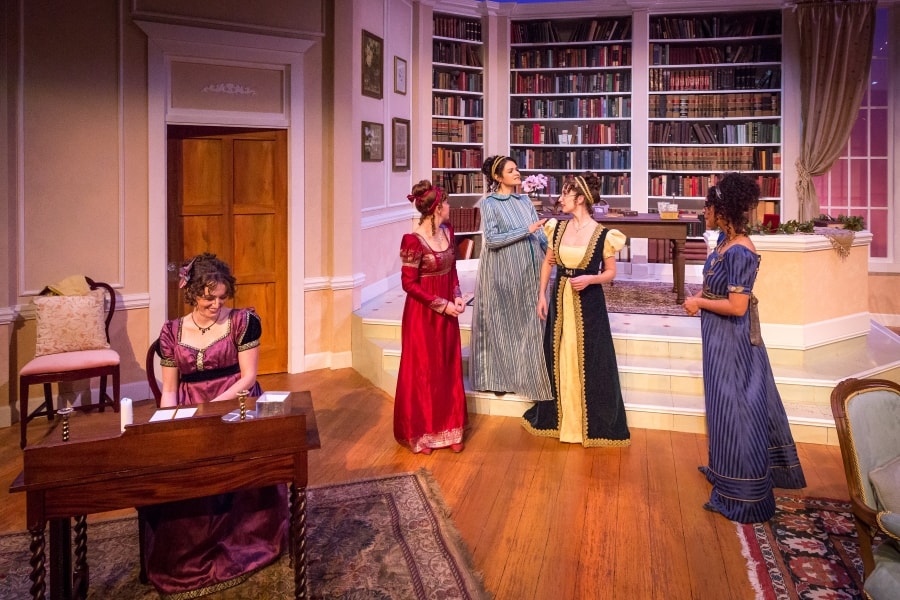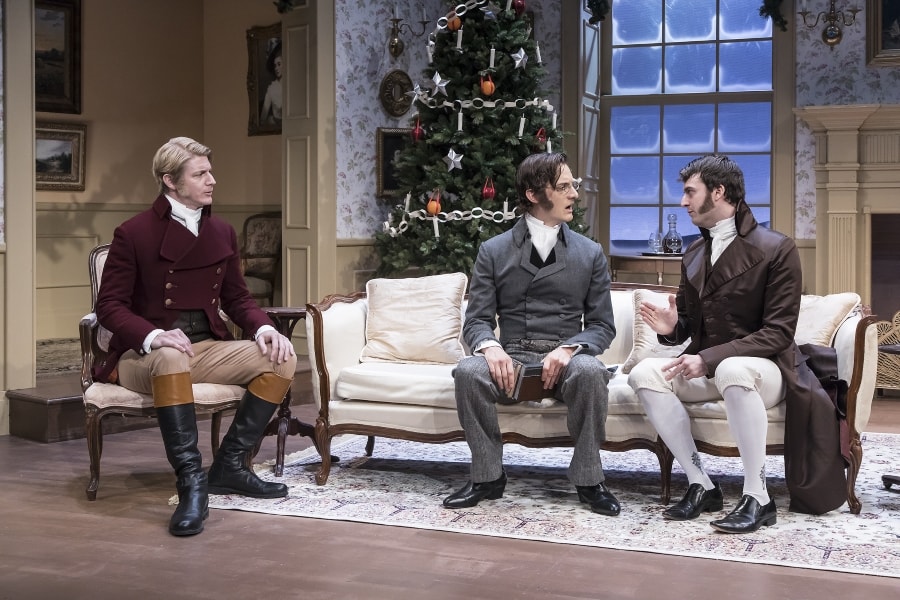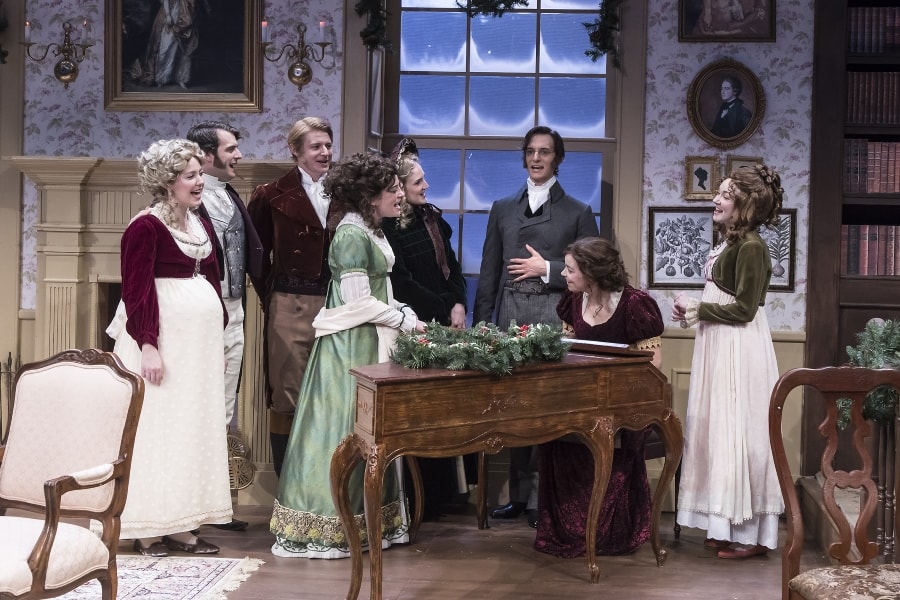It should be no surprise that the family drama so rife in the pages of Jane Austen’s oeuvre, particularly the bubbling pressures of courtship and marriage, makes a good fit for a holiday-themed show. Eggnog, anyone?
Miss Bennet: Christmas at Pemberley, co-written by Lauren Gunderson and Margot Melcon, is styled as a playful sequel to Austen’s beloved novel “Pride & Prejudice.” Taking place two years after P&P’s conclusion, it focuses on the bookish, oft-neglected middle sister, Mary Bennet. This holiday season, the new drawing-room romantic comedy will be mounted at nine* theatres across the U.S., which helped make the play one of the most-produced, and Gunderson herself the most-produced playwright, of the theatre season.
Gunderson and Melcon first cooked up with the idea on a road trip from Berkeley, Calif., to Ashland, Ore. Mapped out on Starbucks napkins, the structure of Miss Bennet held the answer to a fieldwide issue.
“What the American theatre really needed was a new holiday play, and a different kind of holiday play,” says Melcon. But there’s a built-in challenge for any newcomers to the genre. “Part of the reason so many of the holiday shows are done over and over again is because there is a sense of familiarity, and there are beloved characters,” Melcon concedes. Hence the inspired choice of source material: “What characters are more beloved than Jane Austen characters?”
The two Austen fans got to work, though it felt more like play. “She just writes these devastatingly funny turns of phrases,” raves Gunderson of her forebear. “Her witticism, her characters—I laugh out loud when I read her. Especially at her lovely little insults and takedowns.”
Melcon, a dramaturg for whom this was a first playwriting experience, co-wrote the scenes with Gunderson via Google Docs. Gunderson’s sharp dialogue, paired with Melcon’s longer, Austen-like passages, combined to create a script that captures the essence of Austen. And the family bickering woven throughout the story captures the essence of the Christmas holidays.
The play’s plot has the Bennet sisters gather at Pemberley, the grand estate of P&P‘s central couple, Lizzy and Darcy, to celebrate the holidays. Mary, who spends her days playing the pianoforte, studying botany, and brushing up on geography, meets her intellectual and romantic match in Darcy’s cousin, the studious Arthur de Bourgh, who joins the family for the holidays.

The character of Arthur de Bourgh is an original concoction of Melcon and Gunderson, but so is their title character, to a large extent. “Mary Bennet in P&P is woefully underwritten,” says Melcon. “There is very little attention paid to her in the text, but there is enough to see who she is and how she functions in the larger scheme of this family.” Her relative absence from the novel, though, means the playwrights had freedom to extrapolate her without risking much objection from die-hard Janeites.
Lara Toner Haddock, artistic director of Austin Playhouse, where the play runs through Dec. 1-23, programmed it for just the reason the writers wrote it: its “perfect blend of classic characters that everyone knows and loves, and a brand new story. That freshness paired with the familiarly of Jane Austen speaks to the best of holiday traditions, where we do the things we love but we want to make them brand new each year.”
Austin Playhouse audiences are very at home with Jane Austen, as Kate Hamill’s Sense & Sensibility was produced there last spring. While that play called for rolling furniture, Miss Bennet brings a more traditional structure and a one-room setting.
Carolyn Cook, who is directing Miss Bennet at Atlanta’s Theatrical Outfit (Nov. 30-Dec. 24), feels that the play is just what audiences want for the holidays. “So much sharp, witty writing is satirical and cynical—and this is not, it is quite the opposite,” she says. “I find that very uplifting at this time of year, and I think audiences do too.”
Gunderson also notes that the play’s period setting makes it a natural for a holiday slot at theatres. “There’s something about a period piece around Christmas that I think really appeals to people, because it feels so different from whatever stress or world that they’re in in 2017,” says Gunderson. “Zooming back to 1815 feels like a vacation, and the costumes are always luxurious and sumptuous.”
In many ways, Austen’s power to draw audiences is analogous to the power of another 19th-century English author who penned a certain perennial holiday favorite. But there are no ghosts of Christmas past or grumpy misers in Miss Bennet. Gunderson says she was frightened of A Christmas Carol as a child, and Melcon notes that the characters in that tale are miserable until the very end.
“Miss Bennet is the exact opposite—it is designed to be a pleasant, joyful, delightful fun experience not only for the audience but for the actors as well,” says Melcon. Gunderson notes another key difference: “Our main character Mary doesn’t change like Scrooge does. It is not required for her to adjust to the world, but for the world to adjust to her.”

While the text of Miss Bennet is firmly rooted in the 19th century, the character of Mary Bennet is designed to strike some contemporary chords. “She’s smart, capable, awkward—maybe a little bit nerdy—and she is rejecting the traditional values of the society that she is living in and forging her own path,” says Melcon. “We thought Mary Bennet would be a great, kind of contemporary feminist icon to land this story in.”
Feminism is folded into Austen’s works with headstrong characters and sly mockery of patriarchal standards. As Gunderson puts it, the author makes feminism “accessible and charming. It finds its way through these equally minded and equally hearted people, and that is kind of the bare minimum of the point of feminism.”
The play also checks off boxes for producers and artistic leaders looking to program more plays by female writers. “I love that as a director, and as a producer who is looking to put more female playwrights in the season, that I get two women with this show,” says Haddock.
Jonathan Fox, artistic director of Ensemble Theatre Company (ETC) in Santa Barbara, Calif., doesn’t normally program a holiday-themed play to close out the year. But when he saw the listings for Miss Bennet at three theatres last year in American Theatre, he decided to read the script. “I was thrilled to finally read a holiday play that was witty and charming—and the fact that it is Jane Austen doesn’t hurt,” says Fox.
The theatre’s production has garnered attention from The Los Angeles Times, and the local NPR station is even writing about the show. The attention, Fox says, can partly be attributed to the popular novelist.
Though ETC doesn’t usually mount holiday-themed shows, Fox always finds a way to put a Christmas tree onstage around this time of year. For Miss Bennet, the festive tree is written in the script. As an ode to changing traditions, and as a way to make her mark on the Pemberley estate, Lizzy Darcy procures a spruce tree to decorate, borrowing from the German tradition.

The play has the seal of approval from the Jane Austen Society of North America, who were the “scariest audience,” Melcon concedes, but also helped answer questions throughout the development of the play. Austen fans, known as Janeites, will find their share of Easter eggs throughout: mentions of the awkward Mr. Collins, and nods to Darcy and Lizzy’s rocky start. But audience members new to the world of Austen will have no trouble keeping up. Gunderson credits the “lulling gravity” of Austen’s works for pulling people in.
“Audiences love it,” says Cook. “They care so much about Mary Bennet’s story. They are deeply invested in the path to the happy ending, and they are so satisfied when it comes that they start clapping immediately. They don’t wait for the curtain call—it is so gratifying.”
Says Toner, “I imagine it will have legs. It is definitely filling a niche for a type of seasonal show, and people are responding to it.”
The Bennet family Christmas is also being staged at Southern Rep in New Orleans (Nov. 29 – Dec. 23); Repertory Theatre of St. Louis (Dec. 13-24); Capital Stage Company in Sacramento, Calif. (Dec. 6-30); City Lights Theater Company in San Jose, Calif. (Nov. 16-Dec.17); Main Street Theater in Houston (Nov. 11-Dec. 17); Jungle Theater (Nov. 18-Dec. 30).
*A previous version of this article stated that there are eight productions of Miss Bennet: Christmas at Pemberley this season, there are nine.


